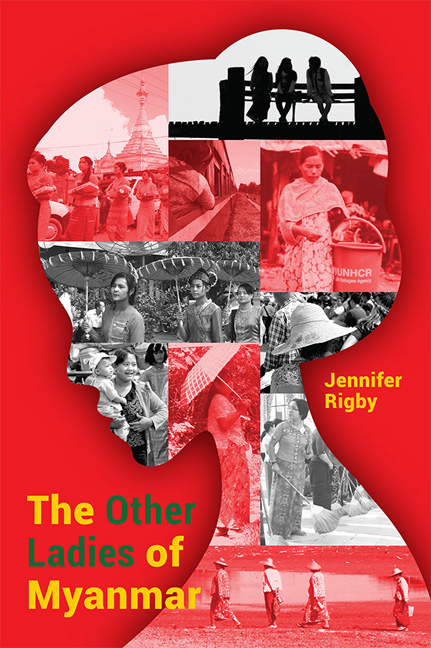Book contents
- Frontmatter
- Dedication
- Contents
- Preface
- Acknowledgements
- Introduction
- Timeline
- 1 The Activist: Cheery Zahau
- 2 The Feminist Buddhist Nun: Ketu Mala
- 3 The Survivor: Mi Mi
- 4 The Businesswoman: Yin Myo Su
- 5 The Environmental Campaigner and Princess: Devi Thant Cin
- 6 The Artist: Ma Ei
- 7 The Refugee Sexual Health Nurse: Mu Tha Paw
- 8 The Rohingya and Human Rights Champion: Wai Wai Nu
- 9 The Farmer: Mar Mar Swe
- 10 The Pop Star: Ah Moon
- 11 The Politician: Htin Htin Htay
- 12 The Archer: Aung Ngeain
- Conclusion
- About the Author
- Frontmatter
- Dedication
- Contents
- Preface
- Acknowledgements
- Introduction
- Timeline
- 1 The Activist: Cheery Zahau
- 2 The Feminist Buddhist Nun: Ketu Mala
- 3 The Survivor: Mi Mi
- 4 The Businesswoman: Yin Myo Su
- 5 The Environmental Campaigner and Princess: Devi Thant Cin
- 6 The Artist: Ma Ei
- 7 The Refugee Sexual Health Nurse: Mu Tha Paw
- 8 The Rohingya and Human Rights Champion: Wai Wai Nu
- 9 The Farmer: Mar Mar Swe
- 10 The Pop Star: Ah Moon
- 11 The Politician: Htin Htin Htay
- 12 The Archer: Aung Ngeain
- Conclusion
- About the Author
Summary
I have a fantastic old Burmese cookbook on my bookshelves, which proudly informs me that there is no need for feminism in Myanmar.
Great stuff, I think. Things must be totally equal here. So, why's that, then? Ah. Hang on.
There is no need for feminism, I learn, “because it is every Burmese woman's sole aim to become a wife.”
The situation for women in Myanmar is actually even more complicated, and multifaceted, than this suggests. Take the country's 2008 constitution. While article 348 proclaims: “The Union shall not discriminate any citizen of the Republic of the Union of Myanmar, based on race, birth, religion, official position, status, culture, sex and wealth”, elsewhere, some government jobs are described as being “naturally suitable for men only”.
While Aung San Suu Kyi is currently the country's de facto leader, she first rose to prominence thanks to her famous father, the country's independence hero General Aung San.
While the country is 80th out of 159 countries in the United Nations’ most recent gender equality index, it is higher than many of its neighbours: Cambodia (112), Laos (106), and even India (125).
And looking at the situation in the past does not clear things up much, either. There is an amazing article in The Atlantic from 1958 by Mya Sein, former head of the Burma Women's Council. It recounts how she was surprised by how fiercely the British colonialists fought back against attempts by the more emancipated Burmese women to get some female representation in the Legislature in 1927.
The backward Brits didn't hold out, though; the first Burmese woman was elected in 1929. But some would argue the situation since then has gone backwards. As the country unravelled in the hands of the generals in the latter half of the twentieth century, women's rights took a similar nosedive.
As such, there are still effectively no laws protecting women from domestic violence, and rape is routinely used as a weapon of war in regional ethnic conflicts. In some rural areas, women have no inheritance rights, no sexual education, and no access to contraception.
- Type
- Chapter
- Information
- The Other Ladies of Myanmar , pp. xiii - xivPublisher: ISEAS–Yusof Ishak InstitutePrint publication year: 2018



